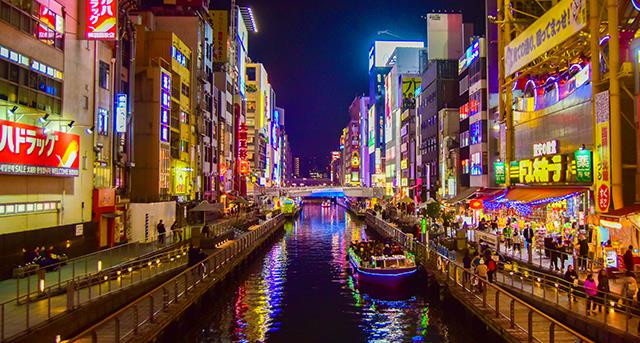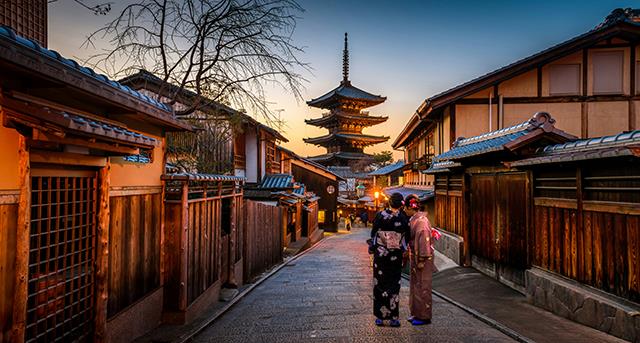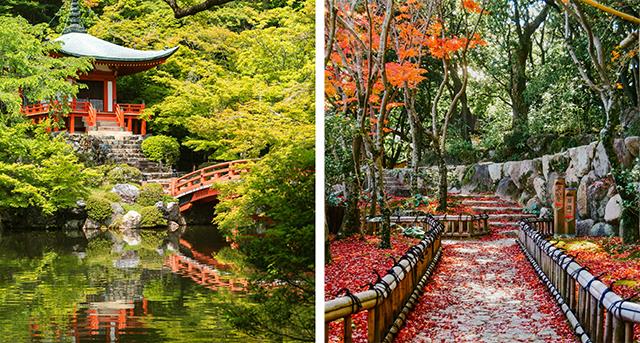Nerves weren't the half of it. Even before touching down in this extraordinary country I couldn't help wondering whether I would have the courage to go skinny dipping with the Japanese in hot springs 6,000 miles away from my home in London.
'Can we wear bathing trunks?' I had asked.
'Absolutely not,' James Mundy, our InsideJapan tour guide, replied robustly. 'Of course, you are under no obligation to take part.'
So it was two days later that one late middle-aged hot-spring debutante clattered bravely in wooden clogs and a thin cotton kimono down the cobbled streets of Kinosaki, a small spa town on Japan's west coast, to the onsen bathhouse. England expects - and I am proud to report that in the end I flew the flag.
On the surface, Japan is Britain's doppelganger. There, on the other side of the world, is a small group of islands off the coast of a huge continent. They even think that they are better than their neighbours, smarter, more sophisticated, more worldly wise. They drive on the left. They understand queuing. They are reserved and courteous. They say sorry when you stand on their foot. All rather like us. On the other hand it is too far, too weird, too little about leisure too much about business and work, too, well, incomprehensible. And what makes this exotic country a once-in-a-lifetime must is precisely those reasons - the similarities and the differences. Or, in a word, the culture.
After all, it might be the last place you ever thought you would go. That's precisely why you must.
My five day 'taster' tour began in Osaka, a vast, modern sprawling port megapolis on the country's south coast, gateway to the markets of China and Korea. What the city lacks in charm it makes up for in drama.

A barrage of LED and neon in the Dotombori district
The first evening started with delicious Wasabi-flavoured cocktails at the Upstairz bar at the modern and well-appointed Hotel Zentis. From there we hopped to the lively Dotombori area where a hallucinating barrage of LED and neon advertising bounced off the narrow canals to the delight of boisterous crowd-packed streets.
Dinner was a steep climb up narrow stairs to a tiny 20-seat restaurant where we were served Okonomiyaki - tasty savoury pancakes on a table that doubled as a hotplate. Afterwards came our first encounter with the glory of Japan, the tiny narrow backstreets where mini-drinking dens jostle with ancient Buddhist temples.
The next day it was off on a two-and-a-half hour train ride through steep wooded valleys and past rice paddies and factories to Kinosaki Onsen - a traditional spa resort on the West coast.
It is on the trains that the country reveals itself. Though a third bigger than the UK, largely mountainous Japan has just a quarter of our agricultural land.
Its 120 million population lives hugger mugger in the valleys - battered regularly by earthquakes and tsunamis. Hence, proximity and shared insecurity mould its society. Hardly surprising then, that conformity, etiquette and deference to rank are what in Japan substitute for religion. Crime is exceptionally low - even the yakuza gangsters eschew guns. Yet Japan's suicide rate is one of the highest in the world. More than half a million young people have such acute agoraphobia that they refuse to leave their rooms. For them, entertainment is delivered through their screens.
Our hotel was a traditional ryokan - Nishimuraya Honkan - a low-rise guesthouse owned by the same family for seven generations and set around an exquisite garden - itself rebuilt at least once after earthquake and fire.
Here the furniture was floor level, the room walls, flimsy rice paper sliding screens, and the futon bed on tatami mats, miraculously made and removed by silky, bowing staff. A brilliant and authentic experience.
Having survived bathing in blood hot waters - almost embarrassment free after the initial jitters - I discussed it with our knowledgeable and fluent guide, Richard Farmer, a longtime Japan resident.
'The thing about the onsen,' he said, 'is that it is about the only place in Japan where status and pecking orders do not prevail - naked we are all equal.'

Kinosaki Onsen - a traditional spa resort
But here was the second revelation about Japan: elsewhere, no one is equal, but all with a set place amid an astonishingly hierarchical and deferential system in which both the community (or the company) and seniority take precedence over the individual. 'The reason everyone works such long hours is not to let others down,' Richard said. 'When I was a teacher nobody left on time, but all waited, sometimes until 10pm, until the Principal went home. No one took all their holiday entitlement.'
The next day our quaintly named Limited Express train took us to Kyoto, spiritual capital of the Emperors - a low-rise city of Shinto shrines and Buddhist temples surrounded by Zen gardens of exquisite beauty. In the streets, tourists and locals, many in Kimonos, mingle with the geishas for whom the city is home.

Kyoto - a low-rise city of Shinto shrines and Buddhist temples
Two ancient temples later, we were dashing for the Shinkansen - the bullet train - and a 220mph rifle-shot ride to Tokyo. More remarkable even than the speed was the landscape.
As soon as we left the Kyoto hills, broader valleys emerged packed with small two-storey houses disappearing right to the horizon, broken only by the outlines of factories, their red and white striped chimneys pointing up like church towers.
The ancient Shinto fairyland of animist beliefs - gods in everything from a rock, to a waterfall or a peach - has evolved into an appetite for fantasy.
Today, this is satisfied by manga and animé cartoons, and an infantile attachment to mascots that bobble below schoolbags.
Maybe, it is the earthquakes that provoke a pining for kawaii - the comforts of kitsch cuteness. For similar reasons, Japanese capitalism prefers collaboration to competition for which, incidentally, no word exists. But companies also act like families and draw strongly on the advice of their shop floors to improve production. They think long term and stay loyal to small suppliers when times get tough.
Arriving in the great Tokyo metropolis was like stepping into a Blade Runner set, but without the ominous sense of menace - a benevolent termite colony and just as disciplined.
Weaving through oncoming crowds at the stations or waiting at pedestrian crossings, one marvelled that anywhere, however scattered with skyscrapers, could house so many.
By comparison, our hotel, The Bellustar, brand new and lodged in the capital's newest 50-storey Kabukicho Tower was an oasis of darkened corridors and chic minimalist design - tranquility high above an ant-heap. The luxury of space without people.

Zen gardens of exquisite beauty
At a dinner that evening, I asked Yohei 'Sunny' Shigeno, our hotel host who had lived also in New York and London, which of the three cities he preferred.
'Oh London, definitely,' he said, appearing to mean it. 'I lived in Putney and I loved the peace and quiet. I loved the people, too. They are quite like us - reserved, orderly, calm and able to keep to themselves.' And Putney has the open heath.
Like, but also not like. That evening our InsideJapan tour guides took us to Golden Gai, a highly atmospheric collection of dozens of tiny, charming bars, housed in wooden shacks beneath the tower blocks - each with sitting space for barely a dozen, sometimes less.
'This, like the onsen,' said Richard, 'is probably the only other environment where deference no longer needs to apply.'
The free-flowing whisky helps. Drowsily musing on this whirlwind experience from the cosy comfort of a Finnair business class flat bed, I was awakened by a flight attendant.
'Just to say, we are flying over the North Pole, she said.
Befuddled by sleep, I raised the shade on my window to look down on an endless barren whiteness 40,000ft below.
Strange, I thought, but then again, not as strange or exhilarating as Japan. Go and see for yourself.
First published in the Daily Mail - July 2023
More articles below...







































